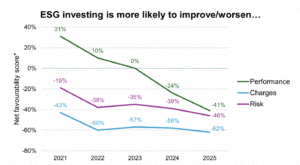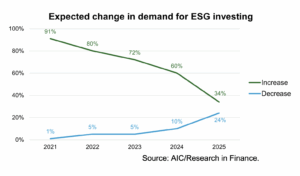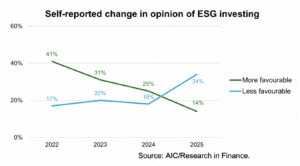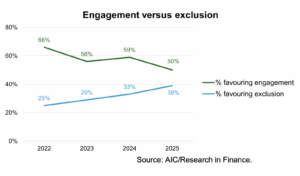Despite an increase in advisers now recommending sustainable funds and ESG now being embedded in their processes, adviser sentiment towards the sector has turned more negative, according to the latest ESG Attitudes Tracker from the Association of Investment Companies (AIC).
A combination of poor performance, faltering client demand and persistent scepticism about sustainability claims have worsened sentiment towards ESG among financial advisers and wealth managers, the report says.
In contrast, the research – conducted by Research in Finance – showed that sentiment towards ESG among private investors has improved over the past year – see here.
Despite 96% of advisers now recommending sustainable funds, they are generally pessimistic on ESG fund performance, with just 10% expecting ESG investing to improve performance and 51% expecting it to worsen returns – a net favourability score of -41%. This continues a downward trend in performance expectations since 2021, when a net 31% of respondents expected ESG to improve performance.
Nick Britton, Research Director of the Association of Investment Companies (AIC), said: “Intermediaries perceive ESG strategies to have lost money and their patience is wearing thin. Ongoing concerns about greenwashing don’t help, and knowledge of the new sustainability labels is still low.
“The bottom line is that if intermediaries see a trade-off between ESG investing and returns, then returns are going to come first, unless clients have specific ESG requirements.”
Advisers quoted in the report, commented: “I cannot remember the last time somebody walked in and said to me, I would like an ESG investment strategy. That does not happen.” Another added: “My most wholeheartedly ESG-focused client who I’ve had for about ten years asked to remove screening. I thought if there was ever a bellwether where demand is heading, it’s him.”

Source: AIC/Research in Finance. * Net favourability score is the % of respondents who expected ESG investing to improve performance, charges or risk minus the % who expected it to have a detrimental effect.
The research found that only 11% of clients proactively raise the subject of ESG in meetings, down from 13% last year and 20% in 2022. While the percentage of intermediaries who expect ESG demand to increase over the next 12 months has fallen from 60% last year to just 34% this year. The percentage who expect demand to decline has increased from 10% to 24%.
Source: AIC/Research in Finance.
The tracker research also found that only 1% of intermediaries “completely trust” sustainability claims made by funds, barely an improvement on 0% last year.
While the FCA’s new sustainability labels have had some impact, it says, with 28% of respondents saying they had increased their trust in such claims, a much greater number – 60% – said they had had no impact. One intermediary commented: “I haven’t really engaged. They could probably do more to publicise it.” Another remarked: “I don’t think clients are terribly aware.”
Of the four labels, Sustainability Focus and Sustainability Impact were the most likely to be used and understood, with less enthusiasm for the Sustainability Improvers and Sustainability Mixed Goals labels. Over two-thirds (68%) of respondents said they had not used any of the labels yet.
Overall, the report found that intermediaries’ general opinion of ESG investing has declined for the first time in four years. A third of respondents (34%) reported that their opinion had become less favourable, while only 14% had adopted a more favourable view.
Source: AIC/Research in Finance.
Despite intermediaries’ lack of enthusiasm for ESG, the research showed that it remains embedded in the way they do business. The overwhelming majority (96%) recommend sustainable funds, up from 89% last year. Intermediaries report that an average 16% of client assets are in sustainable funds, similar to previous years.
While a majority of intermediaries (54%) offer ESG investing to clients depending on their goals and objectives, over a quarter (27%) say it is an embedded part of their philosophy and process. One respondent said: “ESG is not an add on. It is just part of the normal process for selecting the funds within the portfolio.”
One bright spot amid the general negativity, the report says, is that intermediaries feel ESG reporting has improved. Among those who refer to ESG or impact reporting from asset managers, a majority (54%) said that all or most of it was satisfactory, up from 42% last year and the highest figure since the Tracker was launched in 2021.
Ratings agencies continue to receive mixed reviews, with only 20% of advisers trusting ESG ratings and 79% saying that ratings providers should be more transparent about their processes. Two-thirds (67%) feel the move to regulate ratings providers should help.
While intermediaries still tend to favour a strategy of engaging with companies over excluding them from portfolios, the gap between the two views has narrowed.
Given a binary choice between the two approaches2, 50% of intermediaries favoured engagement and 39% preferred exclusion.
Source: AIC/Research in Finance.
Nick Britton, Research Director of the Association of Investment Companies (AIC), said: “The question of engagement versus exclusion divides intermediaries. While most still like the idea of engagement in principle, there are also murmurs of doubt about how effective engagement is and whether asset managers are prepared to divest if it doesn’t work. That scepticism could be behind the rising interest in exclusion, which is a simpler approach for funds to demonstrate and for advisers to explain to clients.”
Main image: andrew-seaman-J65VbXRtgrU-unsplash


































